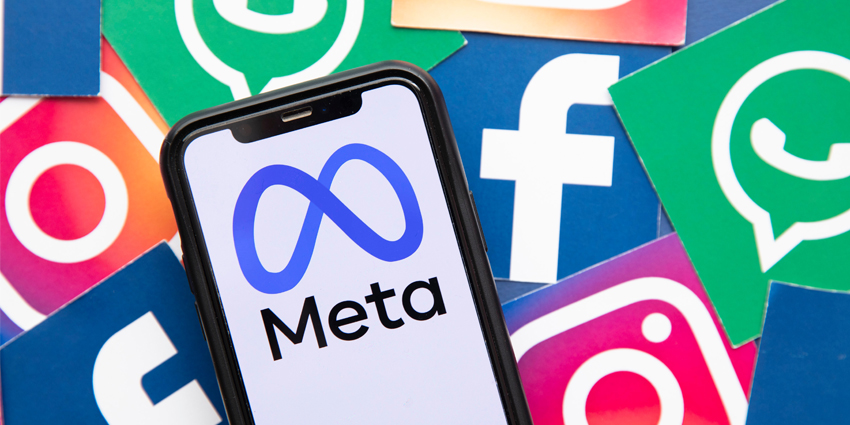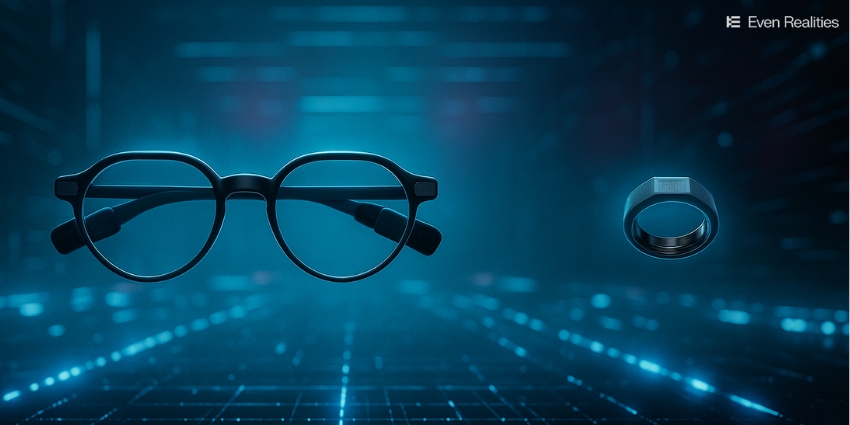It’s been ten years since Meta – then Facebook – bought emerging VR start-up Oculus and, in turn, formed its Reality Labs division. Since the Oculus purchase in 2014, the firm has released numerous headsets, most notably the Quest range, which now includes mixed and virtual reality products. Moreover, in 2023, Meta sees partnerships with various large-scale companies to scale its immersive solutions, notably through a Ray-Ban collaboration over smart glasses and a recent alliance with LG to create unconfirmed AI-ready XR products.
In a recent blog post highlighting the firm’s ten-year immersive journey, the company teased that new smart glasses are incoming.
During the blog post, Meta notes that a new AR device is coming that combines AR and AI in more sophisticated ways. The blog post said:
Just like the smartphone didn’t eliminate the laptop or desktop computer, AR glasses won’t be the end of mixed reality headsets. Rather, we see a constellation of devices forming the fabric of the future. We believe the smart glasses we have now, on the road to full AR glasses, are going to have much broader appeal.
Moreover, the report noted that Meta is “committed to continuing to build out in the open with partners,” notably a partner helping the firm design potential AI immersive smart glasses is LG.
LG wants to establish a technology ecosystem by merging its TV division services with Meta’s XR portfolio. The aim is to develop a competitive XR device by leveraging LG’s smart device OS, which will work with Meta’s AI systems.
LG’s smart OS provides a significant platform of app revenue, worth approximately $750.5 million, for Meta’s immersive product portfolio. This could enable Meta to generate a valuable income source and services for its XR hardware ecosystem, competing with Apple’s Vision Pro offerings.
The Future is Coming
Meta’s blog post on its ten-year XR history pulls a 2014 quote from CEO Mark Zuckerberg, which notes how, to him, “virtual reality was once the dream of science fiction, but the internet was also once a dream, and so were computers and smartphones,” and while Meta’s quest for XR device ubiquity for consumers and enterprises is still far away; the research and progress made by the firm since the Oculus acquisition is monumental and has helped push the industry forward to what it is today.
In 2024, the space saw far less sophisticated XR devices with older products like early Oculus or Google Glasses. Thanks to the time and capital invested by Meta, the industry took slow but careful steps towards what audiences have today: a growing choice between major XR hardware vendors.
“The future is coming, and we have a chance to build it together,” also said Zuckerberg; walled gardens and interoperability should remain at the forefront with quotes like that. While Meta looks to be the sole front-runner of XR, the firm has also respected other devices entering the market, such as Zuckerberg’s review of the Vision Pro.
But the race is on. Initially, Meta remained the key leading champion in the XR space. At the same time, XR’s enthusiasts were well aware of other players in the headset space, like Microsoft, Varjo, HTC VIVE, and others. However, Meta stole headlines with increasingly accessible and affordable devices.
In the general public eye, Zuckerberg became the face of and de facto XR champion when Facebook publicly rebranded itself as Meta to distance itself from its social media umbrella, instead turning into an immersive solutions provider.
When Meta rebranded the space, it was very different. However, from a company evolution perspective, the change makes sense. At its core, Meta is a data company; data revenues drive its social media platforms, and the wealth of data provided by headsets is increasing – therefore, in value for a firm like Meta.
As headsets become more sophisticated, the devices record increasing user data, from hand tracking, eye tracking, environment scanning and more. In promotional videos, Meta highlights how AR smartglasses can recognise brands to help someone cook or order products. It is an exciting consumer use case at its core; however, with Meta’s history with the FTC, one can’t help but wonder about the implications of a firm scanning a user’s environment looking for products.
How will Meta use this data? In the past, the firm caught fire for in-game immersive adverts; hopefully, its highly detailed user information will not be exploited.
Looking at the firm’s XR ambitions in a less critical light. The firm’s success is apparent; by the decade’s end, the company took a niche gaming product and commercialised the device into the mainstream, creating the Quest 2 boom.
Moreover, Meta also introduced wider audiences to the Metaverse a few years ago, which was a bright flame that saw audiences go wild for potential virtual opportunities like owning digital plots on land in shared online spaces.
Meta Horizon Worlds Metaverse platform did not get the same long-term traction as the Quest 2. While users are active on the service, Zuckerberg’s claims about the future of work and adult socialisation on the service fell short – but the dream isn’t dead yet for Zuckerberg.
The firm caught dire feedback for the Horizon Worlds platform, with many features never reaching potential – including animated legs – underwhelming visuals and questioned monetisation techniques, leading to a decline in Metaverse interest.
Meta caught a lot of criticism for handling the Metaverse promise, but this is only because Zuckerberg’s firm went full speed ahead with the concept, making Meta the most prominent firm to take such an interest in the emerging technology and, in turn, the easiest to criticise.
In reality, many firms were contributing to the Metaverse myth, damaging the industry with false, or at least overzealous, promises and mixed with the rise of genAI; Meta’s investments as an immersive tech firm were becoming questioned – especially as Reality Labs losing money each quarter.
But the rise of AI was a boost that the XR space crucially needed. With genAI came increasingly simple ways to create and deploy immersive content, especially with MR headsets. Moreover, following genAI waves came the increase in MR headsets; Meta released its long-awaited Quest 3 headset late last year; more recently, the Vision Pro debuted with a similar but competitive spatial computing promise.
Following a lull in previous years, it seems like Meta’s ten-year investment in the space is finally paying off. Meta is making more products under new significant partnerships, and the once-money-haemorrhaging Reality Labs is securing income!
However, the competition is also increasing, and to remain ahead of its competition and avoid being a footnote, Meta must continue to place its immersive products at the centre of consumer adoption – its target market, seemingly. While the firm is investing in building XR and Metaverse products for businesses, its core demographic is clear.
Meta’s “Year of Efficiency” Leads to Record-Breaking Reality Labs Revenue
Meta in February documented record profits during a fiscal year earnings call, reporting that Reality Labs secured roughly $1 billion during the closing three months of 2023. While the Reality Labs division did lose $4.65 billion across the entirety of 2023, the previous months forecast a potential upward trend, which may also uptick further thanks to Apple’s splash in the XR market.
CEO Mark Zuckerberg said:
Reality Labs crossed $1 billion in revenue in Q4 for the first time, with Quest having a strong holiday season. Quest 3 is off to a strong start and I expect it to continue to be the most popular mixed reality device. With Quest 3 and Quest 2 both performing well, we saw the Quest app was actually the most downloaded app in the app store on Christmas Day.
During the earnings call, Zuckerberg announced that the company had a successful year in terms of revenue and efficiency. He mentioned that the Ray-Ban Meta smart glasses had a strong start in sales and engagement and forecasted increased production due to high demand. In the final quarter of 2023, Meta secured $7.8 billion, resulting in a yearly gain of $32 billion.
Zuckerberg stated that 2023 was the company’s “year of efficiency,” which allowed Meta to focus on becoming a stronger technology company. He explained that this direction has provided the stability to deliver their ambitious long-term vision for AI and the Metaverse. The CEO noted that the company reached its efficiency goals, returned to solid revenue growth, and saw strong engagement across its lineup of applications.
Meta shipped several new products during the year, including Threads, Ray-Ban Meta smart glasses, and the Quest 3, along with a world-class AI effort that will be the foundation for many future products. Zuckerberg remarked that being a leaner company is helping them execute better and faster, and they will continue to carry these values forward as a permanent part of their operation.
The CEO notes that products developed alongside its Reality Labs division, such as Ray-Ban smart glasses and Quest 3 mixed reality headsets, are helping drive the company’s revenue alongside its mainline services. Additionally, Meta will be advancing its AI capabilities following background developments across 2023. AI could play a role in boosting the firm’s Metaverse ambitions, which fell silent towards the end of the year.
Zuckerberg noted:
A major goal will be building the most popular and most advanced AI products and services. And if we succeed, everyone who uses our services will have a world-class AI assistant to
help get things done. – I also think everyone will want a new category of computing devices that let you frictionlessly interact with AIs that can see what you see and hear what you hear, like smart glasses.
The CEO also noted how its Metaverse platform Horizon: Worlds is growing and has become a top 10 application on the Quest app store. Meta has an “exciting roadmap ahead,” Zuckerberg remarked.
Speaking on the Metaverse, Zuckerberg also added:
We’ve invested heavily in both AI and the metaverse for a long time, and we will continue to do so. These days, there are a lot of questions, more about AI that I get, and that field is moving very quickly, but I still expect this next generation of AR, MR, and VR computing platforms to deliver a realistic sense of presence that will be the foundation for the future of social experiences and almost every other category as well.
Meta, formerly known as Facebook, has been investing heavily in several emerging technologies such as AI, XR devices, and Metaverse. The company aims to integrate its technology portfolio and lead in different XR markets. According to Mark Zuckerberg, smart glasses are a promising form factor that can connect their vision of AI and Metaverse.
After a challenging 2022 and 2023, Meta’s performance significantly improved in the approaching years of 2024. The company faced several issues, including financial instability, court cases, and a slowdown in advertising, which impacted its XR investments.
Meta had to reduce its workforce by 14% over the past year, with several layoffs occurring since November 2024. Nevertheless, the company is optimistic that its investments in emerging technologies and efforts to improve efficiency will result in a fruitful outcome.









